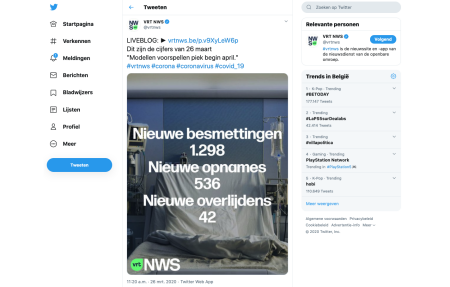Survey on coronavirus pandemic content online: the results
18 Nov 2020The coronavirus pandemic has had a huge impact on our social lives since March, and you can see plenty of evidence of this online: from government announcements to personal blogs and online diaries. As a cultural heritage organisation, we want to keep a record of these unprecedented times for future generations.
We sent out a survey at the start of summer to investigate what online content about the coronavirus pandemic is being archived and what isn’t. We also wanted to determine whether any specific actions were necessary to facilitate this archiving, and what these actions might be.
36 of our content partners – predominantly arts organisations, archives, museums and broadcasters – completed this survey to let us know how they’re providing online communications about the coronavirus pandemic, and what they’re planning to do with this content. These are the main trends:
The majority (71%) of respondents – including sub-groups of arts organisations, archives, museums and broadcasters – are publishing their own content in response to the coronavirus pandemic. This mainly concerns virtual exhibitions and guided tours, new additions to their programmes, and online access to exhibition registrations;
A minority (36%) – mainly broadcasters and museums – have been specifically tasked with publishing coronavirus content. This mainly concerns news items and government announcements that are shared via Facebook, Instagram and on their own websites;
Most of these organisations have plans to archive published coronavirus content in the long term. Slightly more than half of them want to do the archiving themselves, a quarter want support from meemoo, and the rest aren’t yet sure or didn’t answer the question. Some respondents are fully reliant on others for this long-term storage. Meemoo can take on this role as it fits within our mission to digitally safeguard our partners’ archive content and make it accessible and usable. Online content published in response to or about the coronavirus epidemic can also fit in with this mission;
It is notable that archive institutions and arts organisations state much less often that they consider the publishing of coronavirus content to be among their tasks;
The support that respondents want to receive from meemoo concerns advice relating to the capturing and long-term storage of content, the actual implementation of this capturing and long-term storage, legal advice, advice about GDPR, and advice for adding metadata to content;
A minority of 36% have the task of acquiring online content about the coronavirus epidemic for long-term storage. This mainly concerns archive organisations, and also regional broadcasters to a lesser extent. They usually do this by capturing the content themselves or storing it once it has been provided to them. Slightly more than a quarter of them would like support for the capturing stage of the process, and almost half don’t know yet. Meemoo can possibly play a role here as well.

Screenshot van een Tweet van VRT NWS
What needs to be preserved?
Our content partners indicate that they find it important to preserve social media content (from Facebook and Instagram, including stories) and websites. They’re using a wide variety of tools to tackle this archiving in various ways. Some of our partners say that they do not yet have a strategy and tools for this.
We’re investigating what extra support we want to and can offer to capture social media and website content, and preserve it in the long term. A large group of partners are not asking for any support. Even so, we cannot ignore the fact that there is demand from a group of partners which is in line with our mission, and that there is still much uncertainty about how to organise this capturing and long-term storage. There is already some specific information about archiving online content available on our CEST knowledge platform. For example, you can learn how to (in Dutch only):
>>Read the full report here. (in Dutch only)
